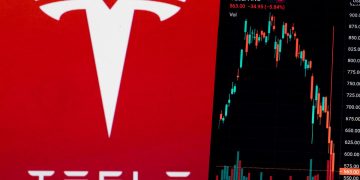TLDR
- Tesla stock dropped 10.4% on Friday following Trump’s 34% tariff announcement and China’s retaliatory measures
- China represents 22% of Tesla’s revenue and houses its most productive manufacturing plant
- The stock has fallen 9.2% for the week as part of broader market decline
- Some analysts suggest Elon Musk’s political stance may be alienating Democratic customers
- Tesla faces increasing competition and declining market share in key regions like California and Europe
Tesla shares plunged on Friday as escalating trade tensions between the United States and China sent shockwaves through global markets.
The electric vehicle maker’s stock fell 10.4% to $239.43 amid concerns about the company’s exposure to the Chinese market.
The drop came after China announced 34% retaliatory tariffs on U.S. goods. This move was in response to President Donald Trump’s similar “reciprocal” tariff announcement on Wednesday, which caught markets by surprise with its severity.
Tesla’s vulnerability stems from its deep ties to China. The company’s most productive manufacturing facility is located in Shanghai, and China accounted for approximately 22% of Tesla’s total revenue in 2024.
Friday’s decline pushed Tesla’s weekly losses to 9.2%, part of a broader market selloff that saw the S&P 500 fall 6% and the Dow Jones Industrial Average drop 5.5% on the same day.
Market Share Challenges
Beyond tariff concerns, Tesla continues to face growing competitive pressures in key markets. In California, the largest U.S. market for electric vehicles, Tesla sales fell about 12% year over year in 2024.
This resulted in Tesla’s market share dropping from 60.1% in 2023 to 52.5% in 2024. The decline occurred despite overall electric vehicle purchases in California nearly doubling compared to the previous two years.
Similar patterns are emerging in Europe. In Germany, Tesla delivered just 1,429 new cars in February, representing a steep 76% decline from the same month last year.
This contrasts sharply with the overall battery-electric vehicle market in Germany, which saw registrations surge by 30.8% during the same period.
Political Complications
Some analysts suggest Tesla may be facing additional headwinds related to CEO Elon Musk’s political positioning. Wall Street Journal’s Tim Higgins compared Tesla’s situation to Bud Light’s controversial moment with some consumers.
“The brand is having perhaps its Bud Light moment among Democrats, being turned off by some of his antics,” Higgins noted during a CNBC program.
This potential consumer sentiment shift comes at a challenging time for Tesla, as its product lineup shows signs of stagnation. Over 95% of the company’s sales still come from just two models – the Model 3 and Model Y.
Meanwhile, competitors continue to roll out new, more advanced models. According to Reuters, Tesla’s European market share is slipping as traditional automakers like BMW post stronger sales.
Chinese competitor BYD is also making inroads in Europe, adding another layer of complexity to Tesla’s competitive landscape amid rising trade tensions.
Economic Uncertainty
The broader economic context further complicates Tesla’s outlook. Goldman Sachs recently raised its recession probability forecast to 35% for the next 12 months, up from its previous estimate of 20%.
Federal Reserve Chairman Jerome Powell acknowledged on Friday that the tariff increases are “becoming clear that the tariff increases will be larger than expected” and would likely lead to “higher inflation and slower growth.”
This economic uncertainty comes despite a strong March jobs report, which showed the U.S. added 228,000 positions, significantly exceeding expectations.
Tesla did not respond to requests for comment about potential cost increases resulting from China’s tariffs. While the new tariffs aren’t expected to dramatically increase Tesla’s production costs, as parts are typically sourced locally, they could impact consumer sentiment in China.
Tesla stock has now fallen nearly 40% year-to-date, dramatically underperforming compared to last year. The company recently disappointed investors with its first-quarter delivery numbers, though Wednesday saw a brief 5.3% stock price recovery before the tariff news triggered renewed selling.
















